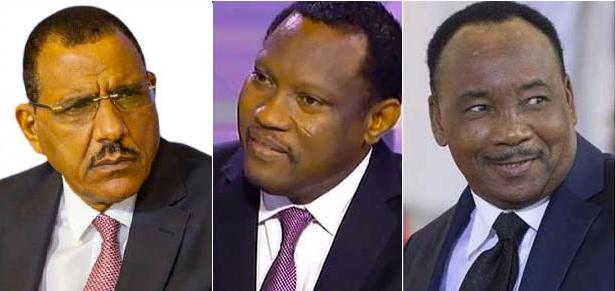Trans-Saharan arms trafficking from Libya is back
Published on 2022 July 29, Friday Back to articles
Trans-Saharan arms smuggling routes from Libya (Source – IISS)
A report written by Hassane Koné — a senior researcher at the Institute for Security Studies’ (ISS) regional office for West Africa, the Sahel and the Lake Chad Basin — suggests that arms trafficking from Libya to Sahel countries may be on the rise again The positive news is that arms and ammunition seizures between January 2021 and February 2022 in Niger’s Agades and Tahoua regions have helped dismantle trafficking networks but they indicated that arms trafficking from Libya is on the rise again.
After Muammar Qadhafi’s overthrown in 2011 the southward arms flows from Libya rose significantly. In 2012, this enabled Mali’s Tuareg rebels, and armed groups operating in the Sahel and Lake Chad Basin, to acquire weapons and ammunition in a period of widespread regional turmoil. The weapons, which were transported by Tuareg fighters and traffickers, were moved along the Algerian and Nigerien borders and transported across the Agades, Tahoua and Tillabéri regions into the three borders regions of Niger, Mali and Burkina Faso, or south-eastwards into the Lake Chad Basin via Niger’s Diffa region.
Koné’s thesis is that the military presence in northern Niger and the outbreak of Libya’s second civil war in 2014 saw arms flows slow down. As demand for guns in Libya increased, jihadist groups looked elsewhere and increased their attacks on army barracks in Burkina Faso, Mali and Niger to increase their stockpiles of arms and ammunition.
According to Koné, several drivers of insecurity in northern Niger facilitate the trafficking of Libyan arms. For example, convoys carrying civilians and gold miners have been attacked in the Aïr area. On 21 March 2021, armed bandits killed 137 people in various attacks in the Tillia commune. The violence prompted the communities in the Agades, Tahoua and Tillabéri regions to arm themselves in self-defence. Infuriated by the state’s failure to keep them safe, some civilians have explored the creation of defensive militaria. This renewed demand has given traffickers an opportunity to continue their lucrative trade. Stocks gathered in south-western Libya are sold to civilians for self-defence, as well as armed groups in Niger, Mali, Burkina Faso and Nigeria.
The ISS research has identified several routes from southwest Libya to Niger that avoid the surveillance systems recently put in place by the US and Niger. Vehicles carrying weapons — often hidden under other goods — follow two broad corridors across Niger. One heads across Niger to Mali, via Agades, Tassara or Tchin-Tabaradene. The other, carrying arms and ammunition to Nigeria, follows one of two routes. One heads east through the Dirkou area towards Diffa or Tasker in Zinder region; and the other to the centre through Agades. The latter is split into three routes: to Aderbissinat and Zinder; to Abalak, Tahoua and Birni Nkonni; and the Madaoua, Guidan Roumji and Maradi route.
The ISS has found that some traffickers store arms and ammunition in caches across Agades and Tahoua before selling them through their dealers. They later unload them in the Tillabéri, Maradi, Zinder and Diffa areas to various buyers, including terrorist groups and cross-border bandits.
Other networks use back routes to transport shipments to Mali’s Ménaka region where they trade with those involved in violence and organised crime in the Liptako-Gourma region. ISS research found that in March, weapons were delivered to this area where fighting is ongoing between the État islamique dans le Grand Sahara (EIGS) and the coalition made up of the Mouvement pour le salut de l’Azawad (MSA) and the Groupe autodéfense touareg Imghad et alliés (GATIA).
Koné’s conclusion is that this current arms flow from Libya is not as substantial as those preceding its second civil war which ended following the 2019-2020 attempt to capture Tripoli by Khalifa Haftar’s self-styled Libyan Arab Armed Forces (LAAF) and its Wagner Group mercenaries when they were forced to retreat in October 2020. A permanent end to Libya’s current increase in militia tensions could increase arms trafficking to neighbouring countries if the domestic demand for weapons decreases. Libya’s excess of arms and ammunition, accumulated since 2014, could feed trafficking networks operating through Niger to the Sahel, Lake Chad Basin and West African regions. This would supply various non-state armed groups and increase regional instability.
The ISS recommends that Niger’s responses to arms trafficking must be strengthened to address this risk. These include more support for the Commission Nationale pour la Collecte et le Contrôle des Armes Illicites (CNCCAI) and reinforcing border patrols in northern Niger. However, a regional initiative would be better suited to preventing a southward resurgence of weapons flows but it must include better military and security cooperation between Niger, Algeria and Chad, and joint border patrols. At the same time, ECOWAS should step up its efforts to combat small arms proliferation in the region. For their part, international partners could provide better-tailored assistance, including intelligence, air support and training.
This excerpt is taken from Sahara Focus, our monthly intelligence report on the Sahara region. Click here to receive a free sample copy.The July 2022 issues of Sahara Focus also includes the following:
Sahel
- France prepares future Sahel strategy after its withdrawal from Mali
- Symposium on Development, Governance, and Human Rights in the Sahel
- Implications
Mali
- ECOWAS lifts economic sanctions on Mali
- Al-Qa’ida affiliate claims deadly attack on Kati military base
Niger
- Six soldiers killed in attack near Chad border
- Niger and Benin sign defence agreement
- Arms trafficking from Libya to Niger is back
Chad
- National dialogue and elections become increasingly uncertain
- Financial scandal involving senior SHT officials
- Reshuffle of transitional government
Mauritania
- Ruling UPR changes name and president
- Election organisation divides political parties
- UNDP to fund access to electricity in 200 rural localities
Burkina Faso
- Military regime struggles to contain violence



